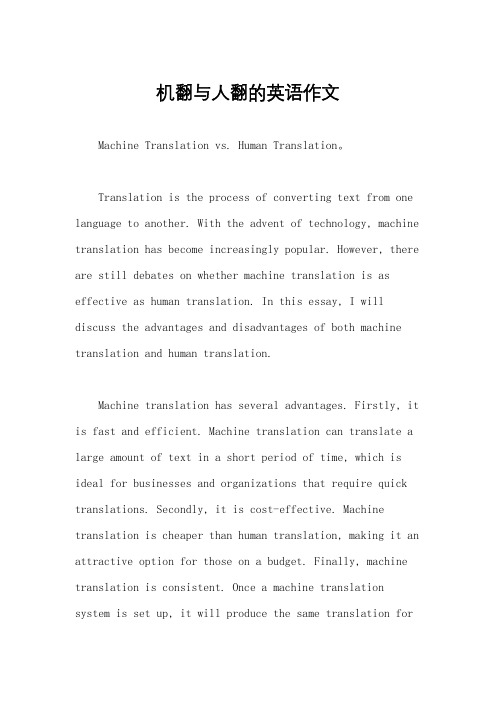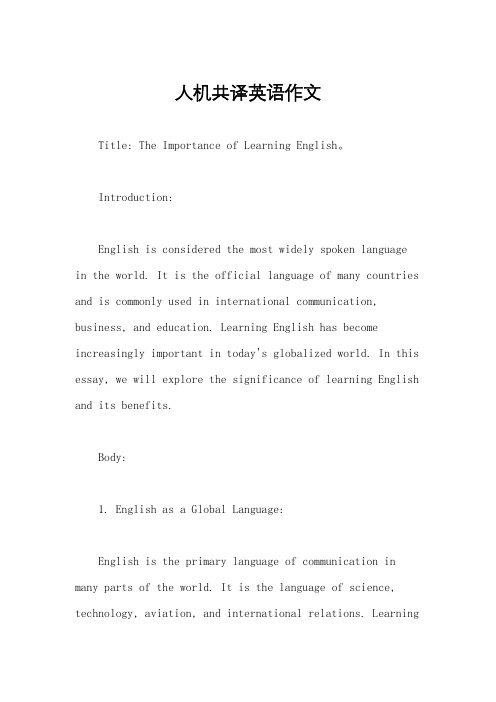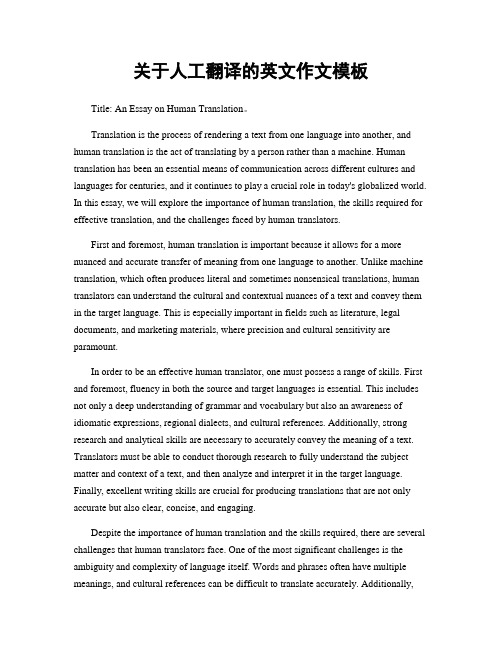机器翻译和人工翻译-大学英语作文
理由一英语作文模板

理由一英语作文模板英文回答:Reason 1: Enhanced communication and collaboration。
By leveraging machine translation technology, businesses can break down language barriers and facilitate effective communication and collaboration across borders. Teams from different countries can communicate and work together seamlessly without the need for costly and time-consuming translation services. This enables organizations to capitalize on global talent and expertise, fostering a more diverse and inclusive workplace.Furthermore, machine translation empowers businesses to expand their reach into new markets, allowing them to engage with customers and partners who speak different languages. By providing content in the native language of potential customers, companies can build trust, establish stronger connections, and drive revenue growth.Reason 2: Increased access to information and knowledge。
外语等级考试作文:机器翻译

外语等级考试作文:机器翻译2015年外语等级考试作文范文:机器翻译【题目预测】Directions: For this part, you are allowed 30 minutes to write a composition on the topic Machine Translation and Human Translation. You should write at least 120 words, and base your composition on the outline (given in Chinese) below:1)现在诸多的电子辞典及相关翻译软件被开发出来,人们不再需要翻阅厚重的字典。
2)有人认为以后机器翻译会完全取代人工翻译。
3)你是否同意这种观点,为什么?【参考范文】Machine Translation and Human Translation In recent years, all kinds of electronic dictionaries and translation software have been developed. With the development of technology, these electronic dictionaries and software can help us translate not only words and phrases but even sentences and paragraphs. So some people come to the conclusion that machine translation will replace traditional human translation. However, I couldn't agree with this argument. Admittedly, translation machines and software bring much convenience for our study and our work. With them, we needn't bother to leaf through the heavy dictionaries. However, machine translation has its disadvantages. First, generally speaking, translation software only can give direct translation, which is sometimes not in accordance with the original articles in logic and meaning. Second, some people depend on electronic dictionaries and software too much, which is unfavorable to their improvement in language ability. Considering the above-mentioned, I think that machinetranslation cannot replace human translation, but it is a good complementary to human translation. Therefore, we should combine machine translation with human translation efficiently.【参考译文】机器翻译和人工翻译近年来,各种各样的电子词典和翻译软件被开发出来。
人工翻译的优势英语作文

人工翻译的优势英语作文Title: The Advantages of Human Translation。
In today's interconnected world, the demand for translation services has never been higher. While machine translation has made significant strides, human translation still holds several advantages that are irreplaceable. This essay explores the unique strengths of human translation over its machine counterpart.Firstly, human translators possess cultural and contextual knowledge that machines lack. Language is deeply intertwined with culture, history, and social nuances. A machine may struggle to accurately convey the subtle connotations, idiomatic expressions, and cultural references embedded within a text. However, human translators, especially those who are native speakers or deeply familiar with the culture, can adeptly navigate these complexities. They can ensure that the translatedtext not only communicates the words but also preserves theintended meaning, tone, and cultural relevance.Secondly, human translators have the ability to adapt and customize their translations according to specific requirements and preferences. Unlike machines, whichoperate based on predefined algorithms, human translators can tailor their approach to suit the needs of the audience, context, and purpose of the translation. Whether it's adjusting the style for a formal document, localizing content for a particular market, or ensuring sensitivity in translating delicate topics, human translators can exercise judgment and creativity to deliver a more polished and effective translation.Furthermore, human translators offer quality assurance and accuracy through their linguistic expertise andattention to detail. While machine translation algorithms rely on statistical patterns and algorithms, human translators bring linguistic knowledge, intuition, and critical thinking to the table. They can recognize nuances, ambiguities, and potential errors in the source text, ensuring a higher degree of accuracy and fidelity in thetranslation. Additionally, human translators can employ various tools and resources, such as dictionaries, glossaries, and style guides, to verify terminology, maintain consistency, and enhance the overall quality of the translation.Moreover, human translators facilitate communication and bridge linguistic barriers by providing personalized and interactive services. Beyond mere translation, they can offer insights, explanations, and clarifications to help users better understand the content. They can engage in dialogue, address queries, and accommodate requests for revisions or modifications, fostering a collaborative and client-centered approach to translation. This human touch not only enhances the user experience but also builds trust and rapport between the translator and the client.In addition to these practical advantages, human translation also upholds ethical standards and promotes cultural sensitivity in cross-cultural communication. Human translators adhere to professional codes of conduct, confidentiality agreements, and ethical guidelines,ensuring integrity, respect, and confidentiality in their work. They approach each translation task with sensitivityto cultural differences, avoiding stereotypes, biases, or offensive language that may inadvertently arise in machine-generated translations.In conclusion, while machine translation hasundoubtedly revolutionized the field of translation and facilitated communication on a global scale, human translation remains indispensable for its unique strengths and capabilities. With their cultural insight, adaptability, quality assurance, personalized service, and ethical conduct, human translators play a vital role in bridging linguistic and cultural divides, facilitating understanding, and enriching cross-cultural exchange in our diverse and interconnected world.。
机翻与人翻的英语作文

机翻与人翻的英语作文Machine Translation vs. Human Translation。
Translation is the process of converting text from one language to another. With the advent of technology, machine translation has become increasingly popular. However, there are still debates on whether machine translation is as effective as human translation. In this essay, I will discuss the advantages and disadvantages of both machine translation and human translation.Machine translation has several advantages. Firstly, it is fast and efficient. Machine translation can translate a large amount of text in a short period of time, which is ideal for businesses and organizations that require quick translations. Secondly, it is cost-effective. Machine translation is cheaper than human translation, making it an attractive option for those on a budget. Finally, machine translation is consistent. Once a machine translation system is set up, it will produce the same translation forthe same text every time, ensuring consistency in translations.However, machine translation also has several disadvantages. Firstly, it is not always accurate. Machine translation systems often struggle with idiomatic expressions, cultural nuances, and complex sentence structures, resulting in inaccurate translations. Secondly, machine translation lacks the ability to understand context. This means that machine translation can produce nonsensical translations if the context of the text is not understood. Finally, machine translation cannot replicate the nuancesof human language. Machine translation lacks the ability to convey the tone, style, and emotions present in human language.On the other hand, human translation has several advantages. Firstly, it is accurate. Human translators have the ability to understand the nuances of language,resulting in accurate translations. Secondly, human translation can understand context. Human translators can understand the context of the text, resulting intranslations that make sense. Finally, human translationcan replicate the nuances of human language. Human translators can convey the tone, style, and emotionspresent in human language, resulting in translations that are more natural.However, human translation also has several disadvantages. Firstly, it is time-consuming. Human translation can take a long time to complete, which is not ideal for businesses and organizations that require quick translations. Secondly, it is expensive. Human translationis more expensive than machine translation, making it less attractive for those on a budget. Finally, humantranslation can be inconsistent. Human translators may produce different translations for the same text, resulting in inconsistencies in translations.In conclusion, both machine translation and human translation have their advantages and disadvantages. While machine translation is fast, cost-effective, and consistent, it lacks accuracy, context, and the ability to replicatethe nuances of human language. On the other hand, humantranslation is accurate, can understand context, and can replicate the nuances of human language, but it is time-consuming, expensive, and can be inconsistent. Therefore, it is important to consider the specific needs and requirements of the translation before deciding which method to use.。
人机共译英语作文

人机共译英语作文Title: The Importance of Learning English。
Introduction:English is considered the most widely spoken languagein the world. It is the official language of many countries and is commonly used in international communication, business, and education. Learning English has become increasingly important in today's globalized world. In this essay, we will explore the significance of learning English and its benefits.Body:1. English as a Global Language:English is the primary language of communication in many parts of the world. It is the language of science, technology, aviation, and international relations. LearningEnglish enables individuals to effectively communicate with people from different cultures and backgrounds.2. Enhancing Career Opportunities:Proficiency in English opens up a wide range of career opportunities. Many multinational companies require employees who can communicate in English. Knowledge of English can significantly increase one's chances of finding a job, especially in fields such as tourism, hospitality, and international business.3. Access to Education:English is the language of instruction in many prestigious universities and educational institutions around the world. Learning English allows individuals to pursue higher education in foreign countries and access a broader range of academic resources. It also enhances the chances of receiving scholarships and grants.4. Cultural Exchange:English serves as a bridge between different cultures. By learning English, individuals can understand and appreciate the literature, arts, music, and traditions of English-speaking countries. It promotes cultural exchange and fosters mutual understanding among people from diverse backgrounds.5. Personal Development:Learning English enhances cognitive abilities such as critical thinking, problem-solving, and creativity. It improves memory, concentration, and overall mental agility. Additionally, it boosts self-confidence and provides a sense of achievement when mastering a new language.6. Travel and Tourism:English is the lingua franca of the travel and tourism industry. Knowing English allows individuals to navigate through foreign countries, interact with locals, and fully immerse themselves in different cultures. It makes travelmore enjoyable and enriching.7. Access to Information:The majority of information available on the internet is in English. Learning English enables individuals to access a vast amount of knowledge, research, and resources. It empowers individuals to stay informed and keeps them updated with the latest developments in various fields.8. Global Citizenship:In today's interconnected world, being a global citizen requires the ability to communicate across borders. English proficiency enables individuals to participate actively in global conversations, understand global issues, and contribute to solving global challenges.Conclusion:In conclusion, learning English is of paramount importance in today's globalized world. It providesnumerous advantages, including better career prospects, access to education, cultural exchange, personal development, and more. Embracing the English language equips individuals with the necessary skills to thrive in an increasingly interconnected and competitive world. Therefore, it is essential to recognize the significance of learning English and invest time and effort in acquiring proficiency in this global language.。
关于人工翻译的英文作文模板

关于人工翻译的英文作文模板Title: An Essay on Human Translation。
Translation is the process of rendering a text from one language into another, and human translation is the act of translating by a person rather than a machine. Human translation has been an essential means of communication across different cultures and languages for centuries, and it continues to play a crucial role in today's globalized world. In this essay, we will explore the importance of human translation, the skills required for effective translation, and the challenges faced by human translators.First and foremost, human translation is important because it allows for a more nuanced and accurate transfer of meaning from one language to another. Unlike machine translation, which often produces literal and sometimes nonsensical translations, human translators can understand the cultural and contextual nuances of a text and convey them in the target language. This is especially important in fields such as literature, legal documents, and marketing materials, where precision and cultural sensitivity are paramount.In order to be an effective human translator, one must possess a range of skills. First and foremost, fluency in both the source and target languages is essential. This includes not only a deep understanding of grammar and vocabulary but also an awareness of idiomatic expressions, regional dialects, and cultural references. Additionally, strong research and analytical skills are necessary to accurately convey the meaning of a text. Translators must be able to conduct thorough research to fully understand the subject matter and context of a text, and then analyze and interpret it in the target language. Finally, excellent writing skills are crucial for producing translations that are not only accurate but also clear, concise, and engaging.Despite the importance of human translation and the skills required, there are several challenges that human translators face. One of the most significant challenges is the ambiguity and complexity of language itself. Words and phrases often have multiple meanings, and cultural references can be difficult to translate accurately. Additionally,the ever-evolving nature of language means that translators must constantly stay updated on new vocabulary and changes in usage. Another challenge is the pressure of deadlines and the need for quick turnaround times. Translators often work under tight deadlines, which can be stressful and impact the quality of their work. Finally, the subjective nature of translation means that there may be multiple valid ways to translate a text, and translators must make decisions about which interpretation best captures the original meaning.In conclusion, human translation is a vital and complex process that requires a deep understanding of language, culture, and context. It plays a crucial role in facilitating communication across different languages and cultures, and it is essential for accurately conveying meaning in fields such as literature, law, and business. While human translators face numerous challenges, their skills and expertise are indispensable in today's globalized world.。
有关翻译技术的英文作文

有关翻译技术的英文作文英文:Translation technology has made great progress inrecent years, and it has greatly facilitated communication between people who speak different languages. As a language enthusiast, I have always been fascinated by the power of translation technology and its impact on our daily lives.One of the most common and widely used translation technologies is machine translation, which uses computer algorithms to translate text from one language to another. For example, Google Translate is a popular machine translation tool that can quickly translate web pages, documents, and even spoken language. I remember a time when I was traveling in Japan and needed to communicate with a local shopkeeper who didn't speak English. I used Google Translate to help me ask for directions and make a purchase, and it worked like a charm.In addition to machine translation, there are also human-powered translation services, where professional translators provide accurate and culturally sensitive translations for a wide range of content. For instance, when I was working on a business proposal that needed to be translated into Chinese, I hired a professional translator to ensure that the message was conveyed accurately and effectively.中文:翻译技术在近年来取得了巨大的进步,极大地促进了不同语言之间的交流。
机器翻译与人脑翻译 Machine Translation and Human Translation_英语作文

机器翻译与人脑翻译Machine Translation and HumanTranslationNowadays, all sorts of translation software or electronic dictionaries are emerging in an endless stream and people can get a lot of help from using of them when studying and working. Therefore, some people say that new translation tools will inevitably replace the human translation one day in that translation software or machines are becoming increasing exact and accurate in dealing with the words or phrases, even the sentences. In addition, compared with human translation, new translation tools are more convenient and less time-consuming.如今,各种翻译软件或电子词典层出不穷,在学习或者工作中人们可以从中得到很多帮助。
因此,有人说新的翻译工具将会替代人工翻译因为软件或机器翻译在处理单词或短语甚至是句子的时候越来越精确。
此外,与人工翻译相比,新的翻译工具更方便、更省时。
However, on the other hand, some people hold that translation machine will never replace human translation, as computer will never replace human brain. The sentences or the passages translated by translation machines are rigid and inflexiblebecause translation machines cannot change or convert the meaning of the words or phrases according to different occasions. And what’s worse, if we depend on translation machines too much, we will be lazy in thinking independently and likely to lose our ability of thinking.然而,另一方面,有些人认为翻译机器永远都不会取代人工翻译就像电脑永远不会取代人脑一样。
- 1、下载文档前请自行甄别文档内容的完整性,平台不提供额外的编辑、内容补充、找答案等附加服务。
- 2、"仅部分预览"的文档,不可在线预览部分如存在完整性等问题,可反馈申请退款(可完整预览的文档不适用该条件!)。
- 3、如文档侵犯您的权益,请联系客服反馈,我们会尽快为您处理(人工客服工作时间:9:00-18:30)。
学术英语作文
机器翻译是否会代替人工翻译
In the past decades, artificial intelligence has brought the light of reform to many areas, translation industry included. The new reform brought us machine translation. As an increasing popular topic, it has inspired people to think that maybe one day, they no longer need to learn foreign languages because machine translation will replace human translation. Though it is not 100% correct, there remains some reasonality within.
Last year, A research team from Microsoft claimed that their machine translation (MT) system has achieved the level of professional human translators when it comes to general news report.
Meanwhile, Google Translate tool has surpassed the proficiency of some advanced learners.
And on Baidu World Conference, Yanhong Li showcased a real-time translation developed by his company.
A trend revealed by all those tech giants’ news ——an accurate and real-time translation by machine is promising in the future.
Meanwhile, new techniques emerge constantly, accelerating the smartness and depth of machine learning. Taking neural network for example……(待补充70词)
Thus, In the coming future, there’s no need for common people to learn foreign languages. Once the translation machines are smart and powerful enough to deal with academic environment and daily life while also portable to be carried with, people will use them to travel, study and live all around the world without language barriers. It will just look like the scenery in the movie The Wondering Earth -- Astronauts from various countries talk in their mother tongue. At the same time, a mini equipment installed in their suits translate their words. However, if you
aspire to be a linguist, you are still in need of the basic knowledge of languages. Because nor the linguist features or the aesthetics in literature of a certain language can be understood unless you know the original language.
So, in the foreseeable future, people can depend highly on machine translation in their cross-cultural communications and academic career, which means a dominant amount of the translation work can be done by machine rather than humans. Though linguists still need a certain level of language proficiency, the translation works done by those experts will only accounts for a tiny part of all the translation world. (=结尾段+主题段)
----------------------------------------------------------------------------------------------
, the beauty of Chinese ancient poetry or Japanese Haiku can’t be fully appreciated in the form of English; The inversion of English and the ellipsis of Chinese can’t be deeply understood if you don’t know those languages. To make it short, linguists and all language learners still need to learn foreign language.。
